Mississippi National River and Recreation Area
The Mississippi National River and Recreation Area (MNRRA) is a collaborative, national park unit located along the Mississippi River corridor through the Twin Cities in Minnesota. The site is part of a cultural landscape around the Mississippi and Minnesota River confluence (Bdóte in Dakhóta) and holds historic and contemporary significance to Indigenous people who share ancestral ties to the land. Some of the earliest Euro-American settlements in the Upper Midwest were founded along the Upper Mississippi River.
The group established the ASCC installation in Crosby Farm Regional Park in Saint Paul in May of 2020. It is the first Affiliate ASCC project site to be planned and implemented in an urban setting. The site is located in a floodplain forest ecosystem dominated by an ash-elm mixed lowland hardwood forest type.
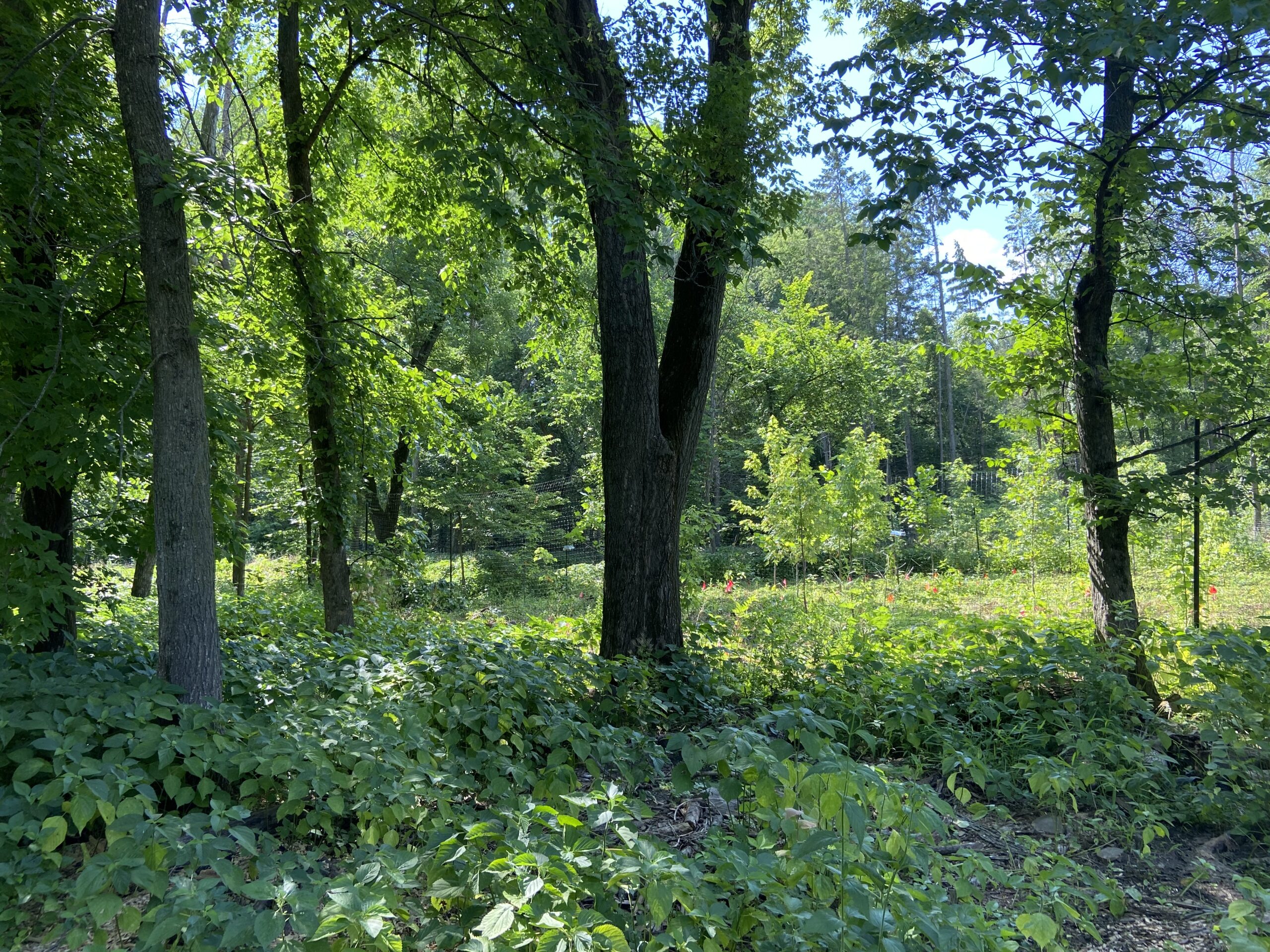
Key Projected
Climate Change Impacts
Key climate change impacts considered for the Mississippi National River and Recreation Area (MNRRA) include:
- Increased temperatures, especially at night, and increased precipitation in heavier rain and flooding events
- Increased drought stress in the summer and dramatic decreases in snow water equivalent
Climate change will present challenges and opportunities for accomplishing the management objectives in ash-elm floodplain forest ecosystems, like those in the MNRRA, including:
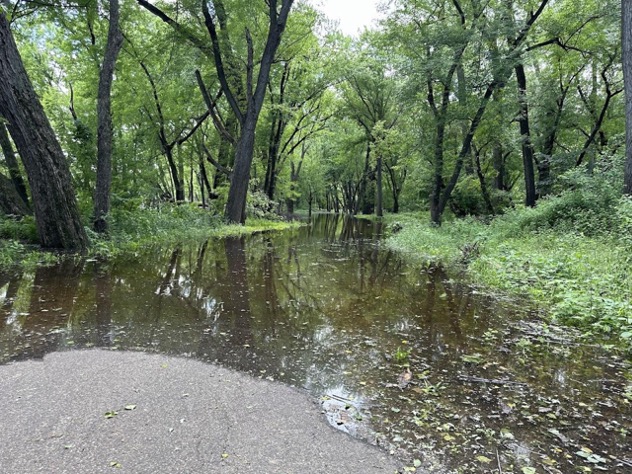
Challenges
- Tree species currently found in the MNRRA are expected to see reduced habitat suitability under climate change, including northern white cedar, black willow, silver maple, cottonwood, and boxelder
- Ash species are declining due to emerald ash borer and are expected to largely disappear from the forest canopy
Opportunities
- Some tree species are expected to have increased habitat suitability under climate change, including bur oak, swamp white oak, hackberry, American elm, and red mulberry
- Habitat suitability for honey locust, sycamore, and swamp white oak is also projected to increase (currently found in similar floodplain forests in southern Minnesota and Iowa)
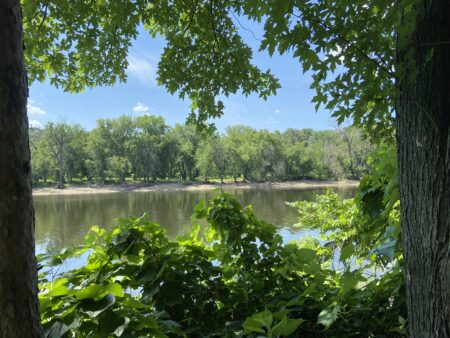
Management Goals & Treatments
A team of natural resource specialists from Colorado State University, Mississippi Park Connection, Saint Paul Parks and Recreation, and local collaborators teamed up with regional scientists from the University of Minnesota and the Northern Institute of Applied Climate Science to participate in a two-day workshop in March 2019 to develop the ASCC treatments for the first urban affiliate site at Crosby Farm Regional Park. From this workshop, it was identified that the highest priority management need and science unknown related to regenerating tree species in mortality gaps created by EAB. Plots were located in already formed canopy gaps from EAB. Mortality was high with some locations having 100% mortality of all overstory trees. Given the high mortality and this being an urban environment, all plots across all the treatments (resistance, resilience, transition, and control) received the same initial overstory treatments. The main difference among treatments relates to the species composition of the planting (artificial regeneration) in the resistance, resilience, and transition treatments and the unplanted control.
Overarching goals across all treatments include:
- Re-establish a closed canopy forest within mortality pockets mostly created by EAB
- Provide wildlife trees with large big crowns, and cavity trees, or snags for nesting wildlife species
- Reduce understory species through competition control to allow for native regeneration
- Manage to decrease invasive species cover (trees and herbaceous layer)
- Protect all regeneration from herbivory using deer exclosures around plantings
- Use volunteers and increase visitation, education, and use of Crosby Farm Regional Park as a teaching forest
- Maintain recreation value and opportunities for multiple use of the area
Across the experiment, all plots received the following pre-planting site prep treatments:
- Sanitation and salvage harvest of all trees within each plot
- Harvesting was done with the use of chain saw and limited mechanized equipment
- Slash was removed from the plot
- Fence all plots with 6 to 8 ft tall fencing
- Artificial regeneration using large stock (5 – 7 ft tall was the goal) – see individual treatments for species planted (no planting in the control)
- After planting, each tree was watered and mulched
- Additional watering occurred year 1 due to drought conditions
Post-planting, weeding through the use of brush saw was completed to reduce impact of competitors.
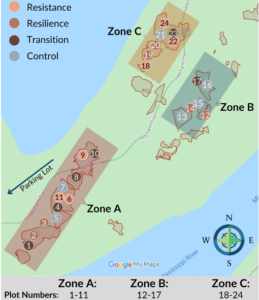
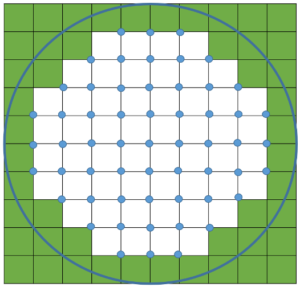
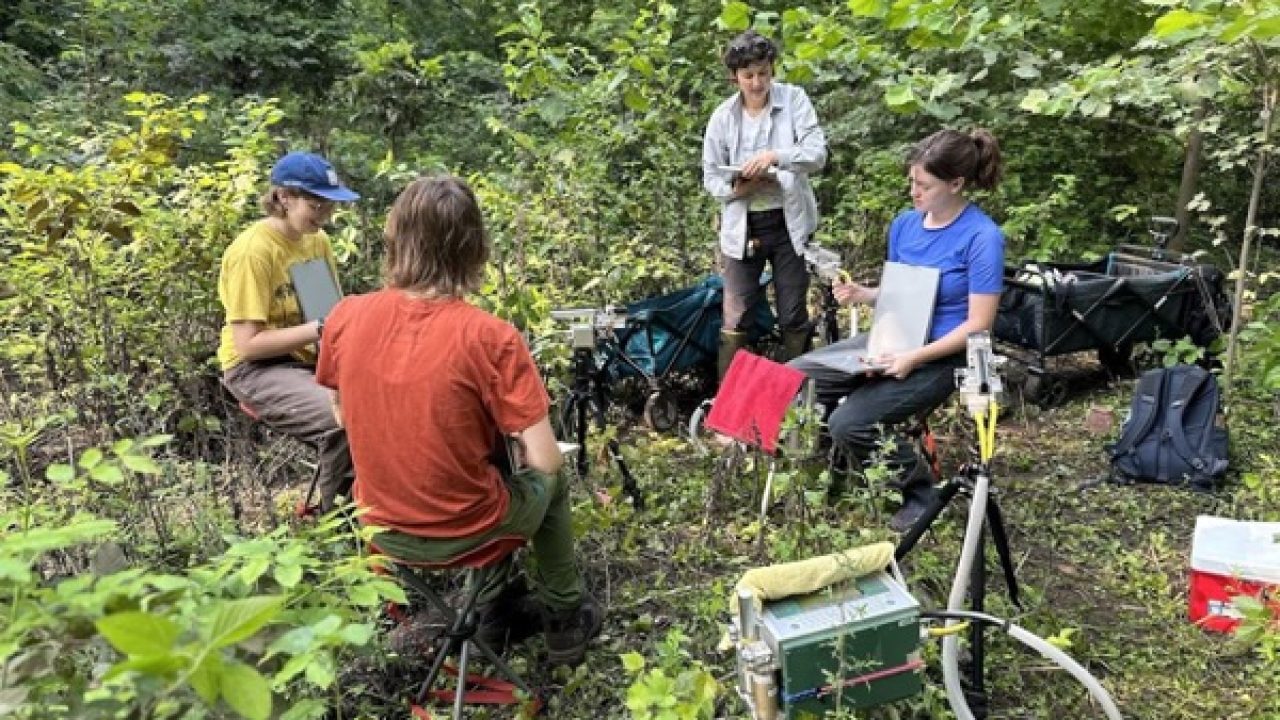
Resistance
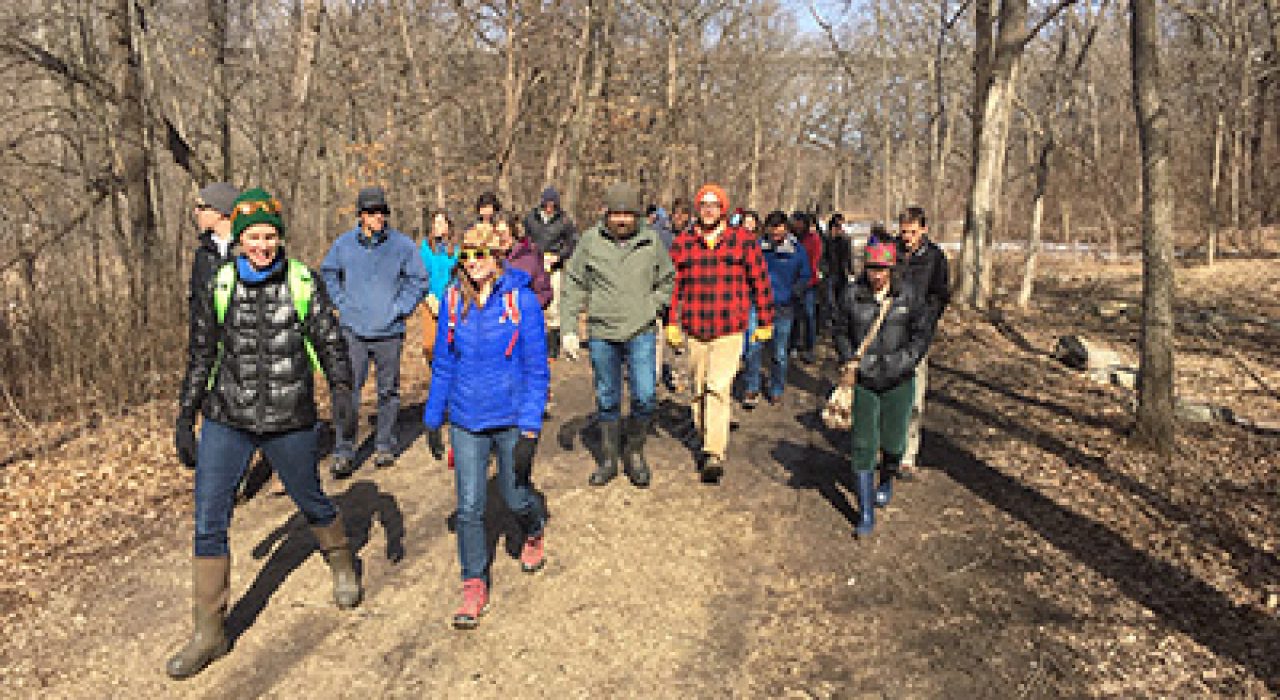
Resilience
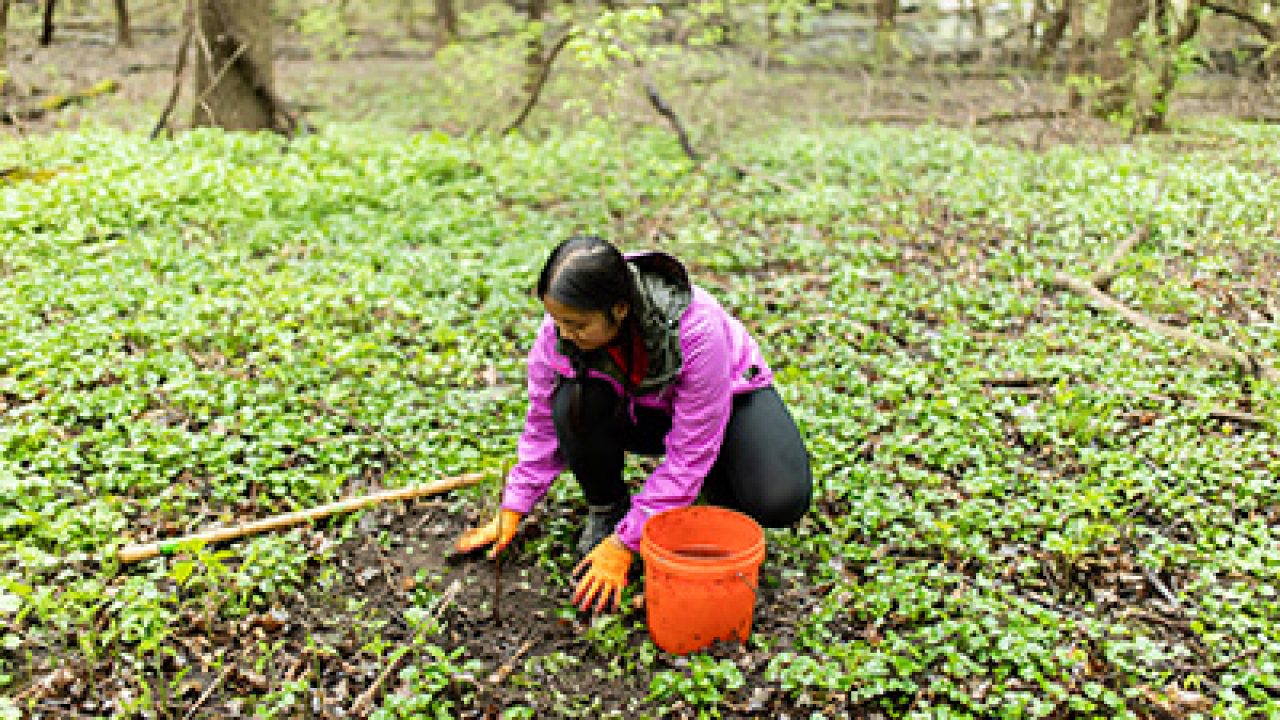
Transition
Monitoring
Monitoring is an essential component of the ASCC study. Research partners from the University of Minnesota and the Northern Institute of Applied Climate Science are working together with the City of Saint Paul to investigate the effectiveness of different management treatments aimed at creating adaptive ecosystems. Some of the monitoring items include:
- Natural regeneration and planted seedling survival and growth, including browse protection and avoided trampling of seedlings, and
- Soil moisture and microclimate conditions.
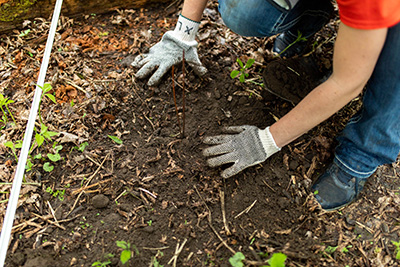
Progress & Next Steps
Plots (6 replicates of each treatment plus controls) were established in 2020. Following the removal of dead ash, 8-foot deer fencing was installed and plots were planted with species selected for the resistance, resilience, or transition treatment. Growth, survival and condition data have been collected biannually in 2020 and annually thereafter. A subset of trees are monitored weekly for phenology.
A key component of this project will be continued community engagement, with an overarching goal of creating an educated, engaged public, involved in local climate adaptation efforts.
Site Leads & Partners
In 2018, Mary Hammes (previously the Environmental Stewardship & Volunteer Manager, Mississippi Park Connection) initiated the MNRRA Urban Affiliate ASCC project through a partnership with Leslie Brandt (previously a Climate Change Specialist, Northern Institute of Applied Climate Science, USDA Forest Service) with funds from the Wildlife Conservation Society’s Climate Adaptation Fund and the Doris Duke Charitable Foundation. The funding and the initial planning process for the core team included Mary Hammes, Leslie Brandt, Marcella Windmuller-Campione, Rebecca Montgomery, and the ASCC Core Team. Additionally, Saint Paul Parks and Recreation staff (Maggie Barnick, Emily Dunlap, and Adam Robbins) and Auste Eigirdas with MPC played key roles in identifying locations for the treatments and working logistics at all stages of the initial planting. MPC is the MOU holder with the City of Saint Paul.
The workshop was hosted in March of 2019 and included these key partners:
- Dakota County Parks
- Friends of the Mississippi River
- Great River Passage
- Macalester College
- Minnesota GreenCorps
- National Park Service (NPS)
- Prairie Island Indian Community
- Saint Paul Parks and Recreation (SPPR)
- Three Rivers Park District
- United States Army Corps of Engineers (USACE)
- United States Fish and Wildlife Service (USFWS)
- United States Geological Survey (USGS)
The MNRRA Urban Affiliate ASCC site was installed in May of 2020 during the pandemic and civil unrest within the Twin Cities; our installation began with volunteers one day after the murder of George Floyd. Hundreds of volunteers came together with MPC and UMN staff and researchers to plant approximately 1,200 3-5 foot tall saplings and install 8 ft tall fencing across 24 – 1/10th acre plots. The team measured height, diameter, and condition in June 2020, followed by condition measurements in July, and final growing season measurements in October. Additional details can be found in the video titled “Plant for the Future” highlights the Mississippi National River and Recreation Area (MNRRA) Affiliate Urban ASCC site. Led by the Mississippi Park Connection, the video highlights the climate challenges the floodplain ash-elm urban forest is facing, and how the ASCC trial site at Crosby Farm Regional Park is an opportunity to explore climate adaptation solutions while planting for the future; and during a global pandemic!
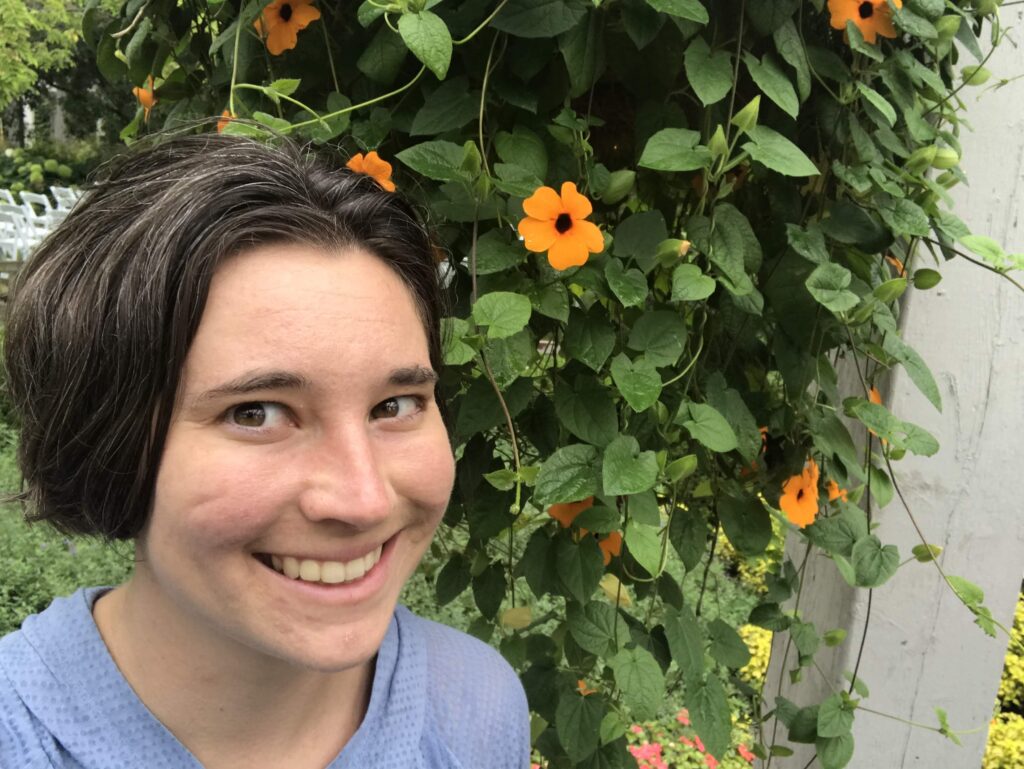
Marcella Windmuller-Campione
MNRRA Urban Affiliate ASCC Site Co-Lead
Associate Professor,
University of Minnesota
330G Green Hall,
1530 Cleveland Avenue North
Saint Paul, MN 55108
Phone: 612-624-3699
mwind@umn.edu
Karen Solas
MNRRA Urban Affiliate ASCC Site Co-Lead
Stewardship Director
Mississippi Park Connection
111 Kellogg Blvd E, Suite 105
Saint Paul, MN 55101
Phone: 651-291-9119
ksolas@parkconnection.org
Leslie Brandt
MNRRA Urban Affiliate ASCC Site Key Science Collaborator
Office of Sustainability and Climate, USDA Forest Service
1992 Folwell Avenue
St. Paul, MN, 55108-1034
leslie.brandt@usda.gov
Rebecca A. Montgomery
MNRRA Urban Affiliate ASCC Site Key Science Collaborator
Professor
University of Minnesota
314 Green Hall,
1530 Cleveland Avenue North
Saint Paul, MN 55108
Phone: 612-624-7249
rebeccam@umn.edu
Emily Dunlap
MNRRA Urban Affiliate ASCC Site Manager
Natural Resources Coordinator
Saint Paul Parks & Recreation
25 W 4th St #400
Saint Paul, MN 55102
Phone: 651-632-2459
emily.dunlap@ci.stpaul.mn.us
Neil Smarjesse
MNRRA Urban Affiliate ASCC Site Collaborator
Biologist - Natural Resource Program Manager
Mississippi National River and Recreation Area, National Park Service
111 Kellogg Blvd E, Suite 105
St. Paul, MN 55101
Phone 651-308-7244
neil_smarjesse@nps.gov
